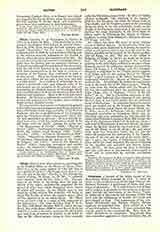

Oliver, GEORGE, b. at Newington in Surrey in 1781; d. at Exeter in 1861. After studying for some years at the Sedgley Park School, he entered Stonyhurst in 1796, went through the full training, and taught “humanities” for five years. Having been ordained priest in 1806, he was sent the following year to the mission formerly belonging to the Jesuits at Exeter, where he spent the remainder of his life. He was not, however, himself a Jesuit; for during his Stonyhurst days the Society had no canonical existence in England, and although the members of the community kept the rule of St. Ignatius so far as was compatible with their circumstances, in the hope of a future restoration of the Society, they continued to rank as secular priests. When the restoration of the Society took place, Oliver did not join it, but lived and died a secular priest. As a student of archaeology he acquired considerable fame, and although some of his conclusions are not accepted at the present day, yet considering the limited sources of knowledge which were available when he lived, his researches show both industry and judgment. Most of his work had a local bearing. He became a well-known authority on the history and antiquities of Devonshire, about which he wrote several standard works.
The one which is best known to Catholics in general is his Collections containing numerous biographical notices of Catholics, both clergy and laity, in the West of England. On the reestablishment of the hierarchy, when the Plymouth Chapter was erected (1852), Oliver was nominated as provost. He had already retired from active work, but continued to reside in his old house until his death. Among his works are: “The Monasteries of Devon” (1820); “History of Exeter” (1821); “Ecclesiastical’Antiquities of Devon” (1828, 2nd edition, much changed, 1839); “Collections Si.” (1838); “A View of Devonshire in 1630” (1845); “Monasticon Dicecesis Exoniensis” (1846); “Collections illustrating the history of the Catholic Religion” etc. (1857); “Lives of the Bishops of Exeter” (1861); numerous pamphlets and smaller works. See Brushfield’s Bibliography of his works, of which the frontispiece is a portrait of George Oliver.
BERNARD WARD

